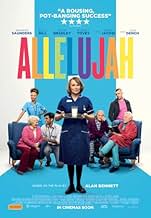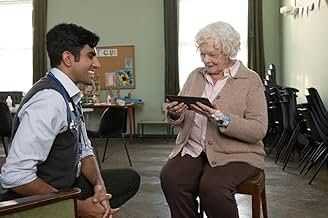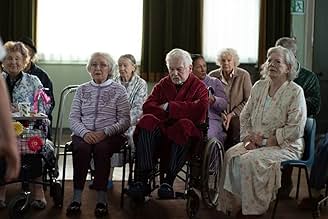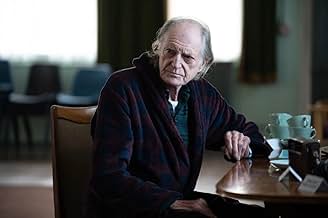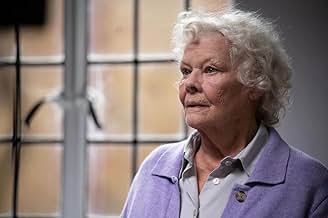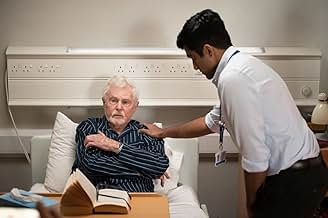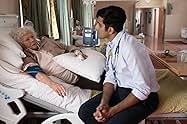Allelujah
- 2022
- 1 h 39 min
AVALIAÇÃO DA IMDb
6,0/10
2 mil
SUA AVALIAÇÃO
A história de uma enfermaria geriátrica num pequeno hospital de Yorkshire ameaçava de encerramento.A história de uma enfermaria geriátrica num pequeno hospital de Yorkshire ameaçava de encerramento.A história de uma enfermaria geriátrica num pequeno hospital de Yorkshire ameaçava de encerramento.
- Direção
- Roteiristas
- Artistas
- Direção
- Roteiristas
- Elenco e equipe completos
- Produção, bilheteria e muito mais no IMDbPro
Avaliações em destaque
On the positive side, the acting was great. I particularly liked Jennifer Saunders' portrayal of a dedicated, no-nonsense ward sister, and David Bradley's retired miner. The underlying message of the threat to the NHS by those that don't understand its core values is an important one. But this film was not the way to make that point.
Although, as you'd expect with a strong cast, the acting was great, many of the characters were tediously stereotyped: the charming Asian doctor who 'loved old people', the bubbly, enthusiastic nurse, a range of old people who used Alan Bennett one-liners to establish themselves as sweetly eccentric, away with the fairies, or curmudgeonly in a loveable way. You could tell just by the body language that the children of an old lady were up to no good and just wanted to fleece her. The son of the miner who had gone South to forge a successful career as a management consultant was predictably transformed from an over-confident critic of the hospital to a supporter.
The setting was not so much stereotyped as confusing. The threatened hospital did have one doctor, one nurse, a sister, and a physiotherapist, and some of the patients were sick - indeed the plot hinged on a character who was worried that if he improved he'd be sent back to a nursing home. But most of the activities that we saw suggested that the institution was a care home - the old people seemed to be long-term residents and were well enough to shuffle around doing craft activities and reminiscence therapy. A film crew from the local paper were drifting around interviewing residents. It was as if the original intention was to make a film about a care home, but they then realised that if they wanted the message to be about the NHS, they needed to make it into a hospital.
I won't include spoilers but just to say that just when you think this is going to be a totally saccharine experience, where the struggling hospital will be saved from closure, there is a plot twist that acts like a hand grenade in derailing all expectations. It might have worked if the rest of the film had been more believable, but it seemed totally unsatisfactory in the context of the rest of the film.
And then, at the end we have bolted on a section where the nice doctor is now in a covid ward, making a heartfelt plea for the continuation of the NHS, while showing devastating scenes of patients in corridors, and exhausted staff in PPE struggling to cope. I found myself wishing that Ken Loach had made a film on this theme: that would have been far more effective than this clunky treatment.
Although, as you'd expect with a strong cast, the acting was great, many of the characters were tediously stereotyped: the charming Asian doctor who 'loved old people', the bubbly, enthusiastic nurse, a range of old people who used Alan Bennett one-liners to establish themselves as sweetly eccentric, away with the fairies, or curmudgeonly in a loveable way. You could tell just by the body language that the children of an old lady were up to no good and just wanted to fleece her. The son of the miner who had gone South to forge a successful career as a management consultant was predictably transformed from an over-confident critic of the hospital to a supporter.
The setting was not so much stereotyped as confusing. The threatened hospital did have one doctor, one nurse, a sister, and a physiotherapist, and some of the patients were sick - indeed the plot hinged on a character who was worried that if he improved he'd be sent back to a nursing home. But most of the activities that we saw suggested that the institution was a care home - the old people seemed to be long-term residents and were well enough to shuffle around doing craft activities and reminiscence therapy. A film crew from the local paper were drifting around interviewing residents. It was as if the original intention was to make a film about a care home, but they then realised that if they wanted the message to be about the NHS, they needed to make it into a hospital.
I won't include spoilers but just to say that just when you think this is going to be a totally saccharine experience, where the struggling hospital will be saved from closure, there is a plot twist that acts like a hand grenade in derailing all expectations. It might have worked if the rest of the film had been more believable, but it seemed totally unsatisfactory in the context of the rest of the film.
And then, at the end we have bolted on a section where the nice doctor is now in a covid ward, making a heartfelt plea for the continuation of the NHS, while showing devastating scenes of patients in corridors, and exhausted staff in PPE struggling to cope. I found myself wishing that Ken Loach had made a film on this theme: that would have been far more effective than this clunky treatment.
Likeable characters emotional film dealing with the problems of old age & the relationships between staff, patients & relatives. Many big names who have aged including a star from the sitcom Desmonds.
Think the Asian doctors accent was over done & the last 5 mins of the film were an unnecessary & spoiled the film for me. No need to end the film in such a way at all.
Russell tovey character was responsible for the advice to close down the ward despite his father being a patient there. Was a bit puzzled by the twist in the film & how it came to light, very simplistic.
Did enjoy the film & for those interested in saving the nhs , who work in care or have elderly relatives , go see this film.
Think the Asian doctors accent was over done & the last 5 mins of the film were an unnecessary & spoiled the film for me. No need to end the film in such a way at all.
Russell tovey character was responsible for the advice to close down the ward despite his father being a patient there. Was a bit puzzled by the twist in the film & how it came to light, very simplistic.
Did enjoy the film & for those interested in saving the nhs , who work in care or have elderly relatives , go see this film.
Being UK based and over 60 years old I found this film a little to close to home and therefore so very powerful. It was funny, beautiful and so very sad. It was Alan Bennett all over. Everything was very small and beautifully presented. There was not an ounce of energy wasted, it was all perfectly placed. All the main characters had a tiny vignette which gave them enough of a back story to make them real people. The doctor was from a society that holds dear it's elderly and silently struggles to understand why his patients aren't held in the same high esteem. The film ends with the Doctors monolog praising the people of the NHS and so it should. A political piece, probably but more a piece about our attitudes to the elderly.
This is a bleak drama, intermittently comic, set in the geriatric ward of an old hospital in Yorkshire which looks and feels like the one where I had my appendix removed in the 1950s.
Jennifer Saunders is the ward sister, efficiently and briskly coping with everything from assisted showers to incontinence and patient deaths. Judi Dench and Derek Jacobi are among the patients, but the focus is mostly on Joe (David Bradley), a frail old gent hoping to be sent home, and his nerdy son Colin (Russell Tovey, the go-to actor for gay roles), who is on the team planning a new hospital.
The Alan Bennett pedigree guarantees brilliant writing and all the cast do eminent justice to the script, but the tone of the movie is unremittingly glum, largely focused on death and dementia, and the dimly lit hospital adds more gloom. The ending is a bit rushed and not entirely in tune with what's gone before.
This is a dark comedy that is perhaps a bit too dark. Our Mr. Bennett has not lost his touch, but the humor in ALLELUJAH is over-laced with bile and bitterness.
Jennifer Saunders is the ward sister, efficiently and briskly coping with everything from assisted showers to incontinence and patient deaths. Judi Dench and Derek Jacobi are among the patients, but the focus is mostly on Joe (David Bradley), a frail old gent hoping to be sent home, and his nerdy son Colin (Russell Tovey, the go-to actor for gay roles), who is on the team planning a new hospital.
The Alan Bennett pedigree guarantees brilliant writing and all the cast do eminent justice to the script, but the tone of the movie is unremittingly glum, largely focused on death and dementia, and the dimly lit hospital adds more gloom. The ending is a bit rushed and not entirely in tune with what's gone before.
This is a dark comedy that is perhaps a bit too dark. Our Mr. Bennett has not lost his touch, but the humor in ALLELUJAH is over-laced with bile and bitterness.
When a small geriatric hospital in Northern England is threatened with closure, the staff and patients rally together to try and save it. There might be a glimmer of hope with this task as the government consultant tasked with the final evaluation - "Colin" (Russell Tovey) has his estranged father " Joe" (David Bradley) in that self same facility. The place is run under the benignly imperious hand of "Sister Gilpin" (Jennifer Saunders) with Bally Gill's "Dr. Valentine" tending to their clinical needs. As you'd expect with Alan Bennett, this comes at you from the left of the political spectrum, and highlights what he sees as the short-termism of fiscally based decision making. To that end, Sir Richard Eyre has assembled a strong cast of formidable character actors to portray the patients. Most notable amongst them, for me, was Julia McKenzie and Bradley is also on great form as the curmudgeonly old gent coming to terms with his predicament and his successful, gay, son. There is plenty of dry humour, observational sarcasm to the fore and Saunders and Gill have quite a nice chemistry between them as they both strive to care for their elderly charges. I can't say that I loved the ending. It is thought provoking, but somehow seemed just a little over-dramatic and unnecessary. That said, though, the ensemble cast reminded me very much "Quartet" (2012) with strong leading characters and familiar faces at every turn helping to highlight the serious (and lighter) issues of the ageing process for both the older folks and for those charged with keeping them well. Not sure it really needs a cinema to enjoy, but it's still well worth ninety minutes.
Você sabia?
- CuriosidadesThe point about the Earnshaws needing their mother to hang on for another three months relates to UK Inheritance Tax. No tax is payable on any gift given more than seven years before the giver dies. If however, the giver dies within seven years, tax can be applied retrospectively. There is a sliding scale, known as taper relief, so that if the giver dies six years after the gift (as here), the tax rate is 8% (from a maximum of 40%).
In the case of large transfers (eg a property), even after various allowances are taken into account, 8% can amount to a significant sum.
- Erros de gravaçãoAfter a death, a pulse is checked using a thumb. You should never take a pulse using your thumb as it has its own pulse.
- Citações
Sister Gilpin: I mean, all these managers, all they think about is movement isn't it? Like the hospital system is just some giant bowel that has to keep pumping out shit.
Principais escolhas
Faça login para avaliar e ver a lista de recomendações personalizadas
- How long is Allelujah?Fornecido pela Alexa
Detalhes
Bilheteria
- Faturamento bruto mundial
- US$ 5.631.642
- Tempo de duração1 hora 39 minutos
- Cor
Contribua para esta página
Sugerir uma alteração ou adicionar conteúdo ausente



